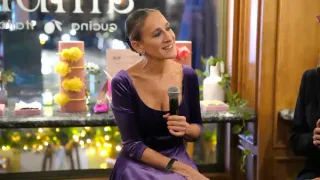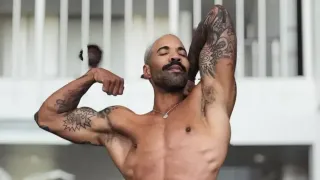November 28, 2015
Die Meistersinger von Nurnberg
Philip Campbell READ TIME: 4 MIN.
Richard Wagner's nostalgic meditation on art and human relationships, "Die Meistersinger von Nurnberg" is his only comedy and also one of San Francisco Opera General Director David Gockley's Top 10 favorites. Fittingly, the local premiere of Sir David McVicar's thoughtfully subtle Glyndebourne 2011 staging, which opened last week at the War Memorial Opera House, features in the American impresario's 10th and final season.
Co-directors Marie Lambert and Ian Rutherford, with Colm Seery re-creating Andrew George's rustic choreography, make their SFO debuts, along with Sir Mark Elder on the podium. 90 instrumentalists, 90 choristers, 17 principal singers, 12 dancers and 19 supernumeraries join in the massive production. It takes a village to make a village, and by the end of the long (sehr langen) performance, the audience is part of the community, too.
Bathed in a honeyed glow by lighting designer Paule Constable, designer Vicki Mortimer's handsome costumes and sets, crowned by an impressive Late Gothic vaulted ceiling, cheerfully evoke small-town life, updating the action from the 16th century to around 1813, the year of Napoleon's defeat at the Battle of Leipzig, and when Wagner was born. German nationalism was, perhaps understandably, on the rise.
By adopting a fresh historical backdrop, McVicar has smartly softened later, more ominous associations attributed to the opera. His treatment of the composer's allegedly anti-Semitic stereotyping of the most rigid character in the story, Sixtus Beckmesser, is also kindly revisionist. The composer's great-granddaughter has admitted that the caricature might have been intentional, but time has long passed since the vainglorious scorekeeper has been so portrayed, and German baritone Martin Gantner, making a stand-out SFO debut, offers a wonderfully nuanced and gently amusing performance that replaces nastiness with universal human frailty.
McVicar's "Die Meistersinger" is all about love, the joy of music, acceptance of aging, and embracing new ideas in an overly ordered culture. We still feel uneasy when the central character Hans Sachs sings of "sacred German art" in the final act, but at least we know he is more concerned with poetic triumph than national supremacy.
Heavy stuff for a "comedy," and Wagner takes his time making his points. McVicar's rich tapestry is refreshingly audience-friendly, moving the action with a pleasing lightness. The comic moments are genuinely amusing. Without any cuts, Elder doesn't rush things, but he also doesn't dawdle. The gorgeous sheen on the strings is transparent enough to hear detail in the rest of the orchestra, and it is amazing how quickly the British conductor has mastered the quirky acoustics of the right side of the pit.
English baritone James Rutherford took the enormous role of the philosopher-cobbler Sachs after Greer Grimsley cancelled. He is no stranger to the part. Looking and sounding a tad young, he has already proven himself in Vienna, Hamburg, and notably at the Bayreuth Festival (the sacred home for Wagner). It is good watching his relatively low-keyed portrayal grow in stature throughout the marathon, and his voice is clear and penetrating. The long monologue in Act III was particularly effective, and one can easily picture him with the much younger character of Eva in a more romantic light.
SFO debutante soprano Rachel Willis-Sorensen also makes her role debut as Eva, the most sought-after girl in Nurnberg. She may be from Richland, Washington, but she looks every inch the pretty madchen . Her pure voice is bright and lovely, and her acting adds depth to an ordinarily rather bland part.
SFO regulars were justifiably excited at the prospect of attending American tenor Brandon Jovanovich's role debut as the young nobleman Walther von Stolzing. Talk about dream casting. Jovanovich has it all: a rich, ringing voice, good looks, magnetic stage presence and convincing acting skills. Despite an announcement cautioning he was soldiering through a slight cold, he didn't disappoint. Two noticeable but slight cracks didn't harm his strong performance. The final "Prize Song" came off without a hitch, probably aided by waves of support coming from the transfixed crowd.
Estonian bass Ain Anger, in his SFO debut as Eva's father Pogner, is known internationally for his Wagnerian skills. His sturdy performance hopefully assures his return after Matthew Shilvock takes the reins from David Gockley.
In the smaller parts of the apprentice David and his love Magdalene, tenor Alek Shrader and mezzo-soprano Sasha Cooke were predictably flawless. Cute as the buttons on lederhosen, they filled the auditorium with big, beautiful voices, suitably scaled to their characters. Joining the three leads in the glorious quintet ending the first part of Act III, they helped to produce a sublime moment of transcendence.
Space cannot allow mention of all the other master singers by name, but they really couldn't have been bettered, and Ian Robertson's choristers romped and sang with the best of them. The riot scene at the end of Act II was marvelous. The telling details in their interactions were big fun, and intelligent directorial touches illuminate most of McVicar's warmhearted staging.
If five hours and 40 minutes, with two intermissions, is unavoidably demanding, dedicated Wagnerites on both sides of the footlights still looked happy and energized at the final curtain. As David Gockley advises on the SFO's website: Take a nap and have a light meal beforehand.
"Die Meistersinger von Nurnberg" continues in repertory through Dec. 6. Go to sfopera.com






